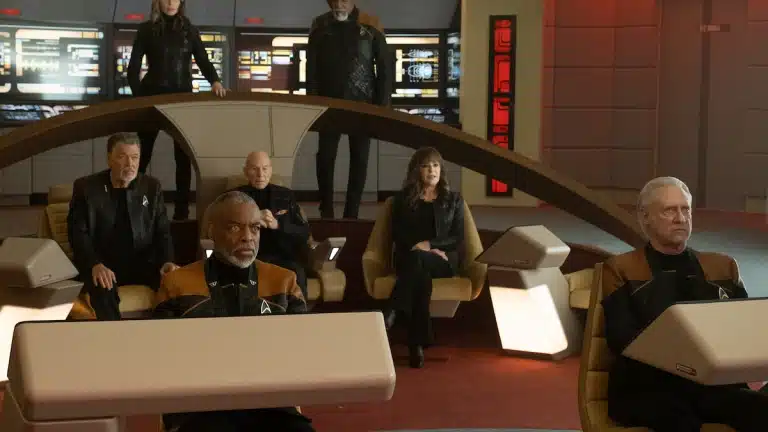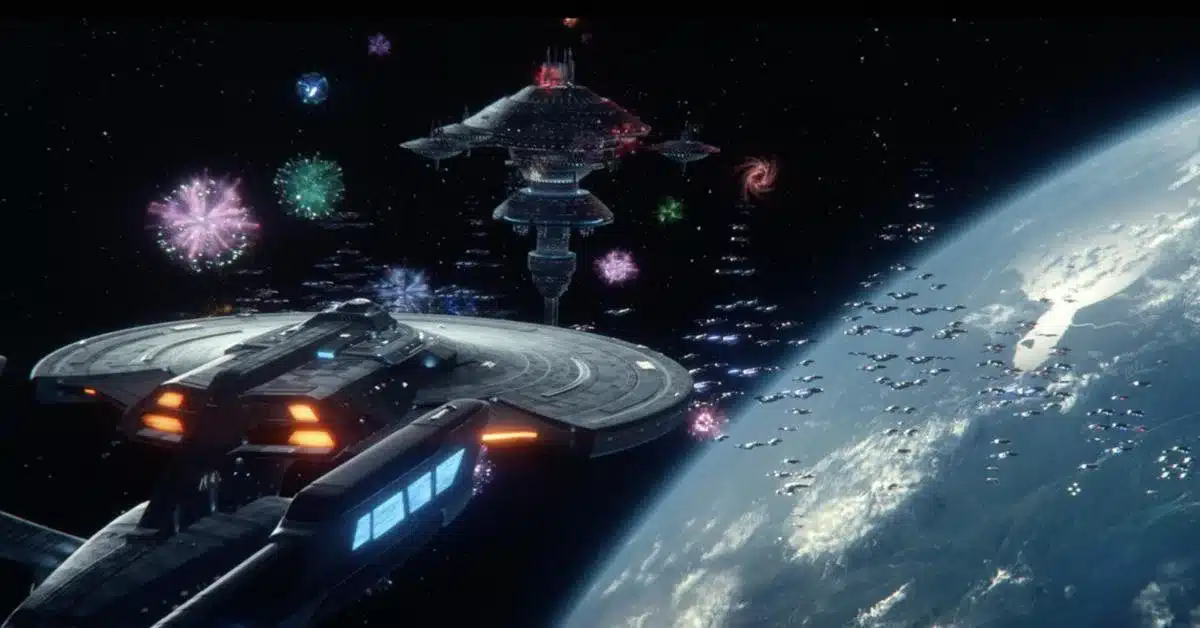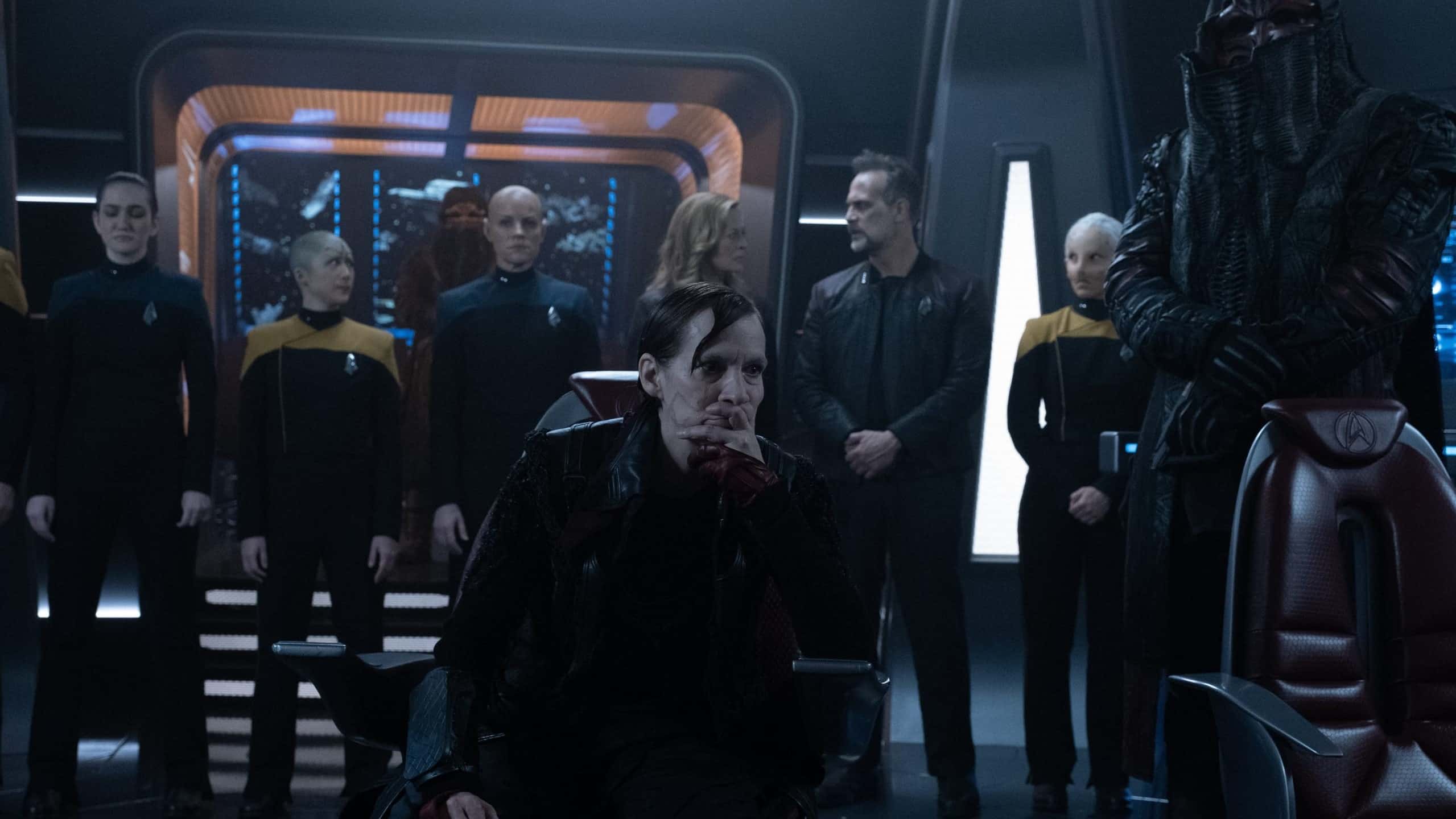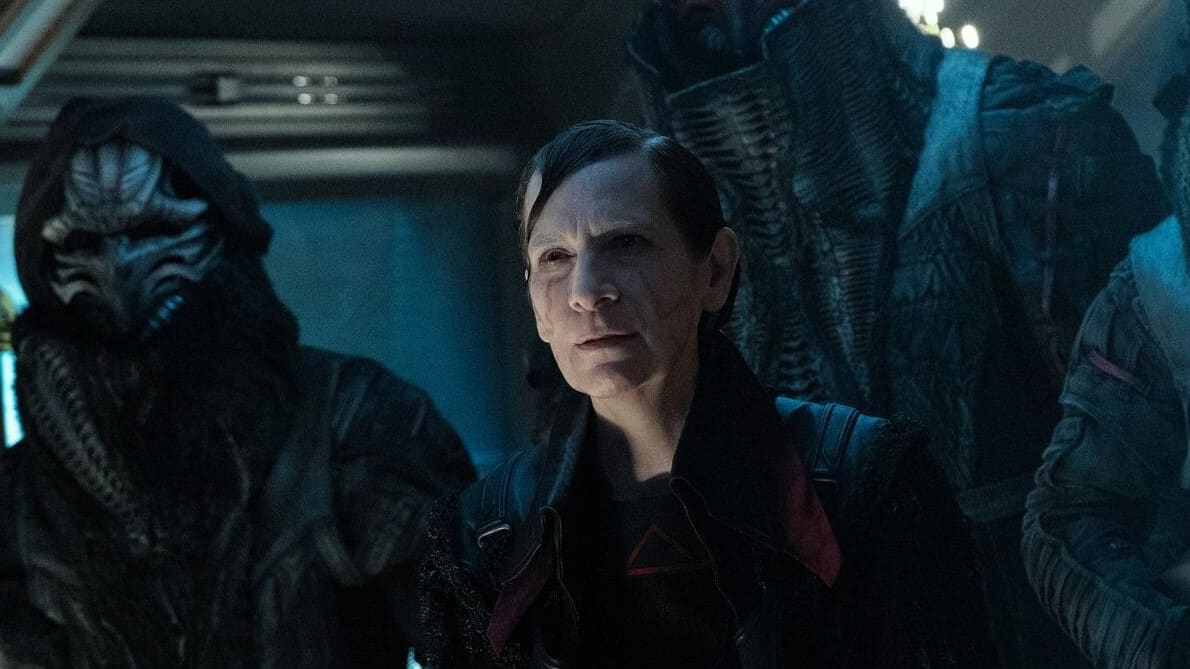Picard finds himself in a fascistic hell, and the former crew of the La Sirena must reunite, striving to put right what once went wrong, and hoping that the next leap will be the leap home. Written by Akiva Goldsman, Terry Matalas & Christopher Monfette, directed by Douglas Aarniokoski.
Grandé Inquisitater Mark Turetsky: Ah, Will, welcome to my terrorarium. Just another normal day here at ComicsYG, the website where we’re evil about comics and things.
Col. Will Nevin: That’s “Colonel Will” to you, soldier. We’re at war against comics. And television. And the streaming services that pass for television these days.
There are five lights. And this is the review of the second episode of the second season of Picard. Guns hot, Mr. Turetsky.
Q & A
Will: John de Lancie — ageless wonder that he is — pops in for what amounts to an extended cameo in our second episode. (Unlike Guinan, though, you figure he’s going to be back at least a few more times.) This Q is a little different, more violent and a character Picard marks as unwell — what did you think of his appearance here?
Mark: I think their sparring here is phenomenal. It feels like there are stakes in this sequence that I feel like were missing previously in this series. And I don’t mean that in “the galaxy is about to be overrun by rogue AIs from beyond” stakes, I mean personal stakes for the actors in the scene. Q’s always been, I think the technical term is, “a real stinker.” But whereas in his previous appearances he was impish and mischievous, here he’s bringing a ton of menace. And I think maybe it comes from a place of anger and hurt. Previously, he’s been so above things, but here he’s personally angry with Picard, as if Picard has betrayed his trust. And when Picard asks him why he’s brought him to this timeline, Q responds, “This is the only life you understand.” My personal theory behind it is that, well, Q has just witnessed Picard commit a heartless genocide against the Borg. They came seeking peace, and he killed their queen, who was sent over in trust. I still think the Borg encounter was a misunderstanding. And Q saw that lingering xenophobia in Federation humans, and he saw the man he thought of as the pinnacle of human ethics, someone he considers a personal friend, and he failed the test. Miserably. So, Q is showing him a world that results from giving in to such thinking.
That’s my theory at least.

Will: Fuck, that’s a great reading of what’s going on, and that might be where this suffers a little as a series rather than a one or two-hour episode — because it’s so decompressed, Q can’t come right out and say that here in his first episode because we’re got eight more hours of television to fill.
One thing that really hit me in the opening was that Patrick Stewart physically can’t do this much longer (which might be one reason that the third and final season is currently filming) because his voice is fading. The man is 81, and time comes for us all, I suppose. Just one more reason I hope this series can get over its consistent problems — like thinking Q’s references to “Yesterday’s Enterprise” and “In a Mirror, Darkly” are clever — and really send this character and Stewart out on top.
Mark: I had to do a Google Ngram search to see if “yesterday’s enterprise” was a phrase that existed before that particular TNG episode (spoiler alert, it didn’t). I half expected to see an exchange from Shakespeare being like,
Rudolpho: Hail, good friend, how goes the spice trade?
Ernulphus: Spice? ‘Twere yesterday’s enterprise. Today’s is rum!
but alas, it’s just a moment of pure, weird fourth wall breaking for Q. I’d expect, nay, revel in this from Lower Decks, but not here. Not like this. At least “in a mirror darkly” is a quotable Bible phrase.
One thing I loved in this sequence was getting to catch up with some of the best friends from Deep Space Nine. There’s Gul Dukat, General Martok and Grand Nagus Zek. Well, they’re there as skulls in Picard’s study, at least. And incidentally, Dave Blass has posted a photographic tour of the skulls on his instagram here.
Will: That’s some great fake Shakespeare there, hoss. But, yeah, I hate that we’re in this broader cultural moment in which references pass for quality writing. The nods to Trek history are great — so long as they make sense in-universe and they’re not just references for reference’s sake. The trophy room? Great. Acknowledging important ships and characters? Similarly great. Lines that make Q a dour Deadpool? No. None of that.
Mark: So, when Q leaves, Picard is stuck with his android valet, Harvey, watching a propagandistic recruitment video his counterpart had made. I personally enjoyed the version of the “explore strange new worlds” spiel here: “We conquered the stars. We sought out and subjugated savage civilizations, boldly conquered war-like alien worlds, increased the wealth and resources for future generations of humanity.” What about you? Did this seem like it was too cute of a nod? Too meta?
Will: It probably walked right up to that line without crossing it, hitting me on the good side of Zefram Cochrane’s “yeah, this has gone too far” reference to “star trek.” The Gen. Picard stuff as a whole was fun and was the right place for Stewart to ham it up — unlike last season’s “Stardust City Rag,” which I thought may have been the low point of all Next Gen-related media and the episode that made me really start to late season one.
Mark: Bjayzl that was cringe. You know, as The Kids say.
The Gang’s All Here
Will: This isn’t our first alternate timeline/mirror universe rodeo, but this is our first look at the Confederation of Planets, a version of our benevolent UFP that’s decidedly more racist (specist?) and militaristic. I like this as an alternative to another visit to the Mirror Universe because there’s only so far you can take goatees and assassination as career advancement. It’s also a pretty good analog to our current desire as a country to play footsie with strongman-style fascism. Still, I couldn’t help but think they didn’t go as dark as they could — there’s no way the Confederation wouldn’t be lily white and straighter than the lines on a Borg cube. (Although unqueering Seven is more than a little suggestive in that latter department.)
Mark: It definitely has some of the feel of the mirror universe, which is curious, because that plot device was just used a few years back in Discovery’s first season. It was so overtly about the current political moment, down to Lorca calling to “make the Empire great again.” And I don’t doubt that it will get even more direct as our characters confront the United States of 2024 as we know they’ll be visiting. It’s interesting to me that Q chose these specific people to join Picard in the Confederation Timeline, since Raffi and Elnor were on the Excelsior and not on the Stargazer when it blew up. Add to that Soji and Laris don’t seem to have come over with them. Both Isa Briones and Orla Brady were in the opening credits as series regulars last week, and are missing this week. I’m wondering if we’ll see them at all before everything is set right again. In the case of Brady, it seems especially cruel since it was her first episode as a regular, reminiscent of when Joss Whedon added Amber Benson to the Buffy opening in the same episode where he killed her character off.
But in keeping with the theme of Isa Briones showing up in multiple roles playing different members of her family, Seven’s husband, the unnamed Confederation Magistrate, is played by Briones’ father, Jon Jon.
Will: Since you brought up the magistrate, that’s another spot where I thought the writing was a bit soft. They clearly wanted to give Seven a husband *and* they wanted to position someone in authority who could question the Confederation president’s decision making. Why they combined that into one character, who knows. (Actually, I have a good guess: We’re not spending much more time in Confed Hell World, so we don’t have the space to do character development for President Annika Hansen.)
Mark: That bit didn’t bother me so much. Like, to me it makes sense that this society would be built on distrust of the family unit. So, instead of your spouse being someone you could put your absolute trust in (ideally, of course), your spouse is your No. 1 liability. Not even the president is immune from that. It’s reminiscent of totalitarian societies that encourage children to report parents to the authorities if they expect them to be subversives. But yes, it also does smack of having space in this pretty expansive episode for just one major guest star.
Speaking of Annika/Seven, I really loved that the first thing she does when she wakes up is to perform a self-diagnostic. It very much reads like the sort of thing Borg drones do to test out their biological components.
We meet up with the rest of the crew. We get Rios, who’s once again the solo captain of the La Sirena, Raffi and Elnor, who are the head of Earth security and a Romulan terrorist/freedom fighter and Agnes, whose job it is to prepare the Borg Queen for a public execution, likely due to her expertise in AI and synthetic life. What’s your read on the Borg Queen? I would have just assumed she’s someone Q had them switch places with, like everyone else, but Seven thinks it’s because Borg Queens just inherently tap into the timeline being messed up.

Will: This Queen does not seem to be the one from the Stargazer, and I’m still trying to figure out why we have those radically different depictions, with this one being much more consistent with the Queen’s prior appearances. The only thing I feel absolutely confident in saying is that she’s going to try to assimilate Agnes at the most inconvenient time possible — and ol’ Agnes is going to polish up that “not guilty by reason of alien influence” defense yet again.
Mark: I wouldn’t be so sure about them being different queens. We don’t know why the one from the Stargazer was veiled like that, but she could just look different in this universe. Like how Annika doesn’t have Seven’s Borg implants.
I’m also wondering about Confederate!Agnes’ personal beliefs. She’s got this digital assistant, Spot 73, played by Patton Oswalt, who calls Eradication Day “barbaric.” I’m wondering if Confederate!Agnes feels that way, or if she just finds it amusing to make her assistant that way.
Anyway, they’ve got a pretty big wildcard in The Borg Queen. I gotta say, I dig the idea of her being on the team for the season.
Picard’s Seven
Mark: Once the whole gang’s been brought back together, it’s time to Escape The Planet of the Fash. The plan is, during the big Eradication Day Ceremony, Jurati, Raffi, Elnor and Rios are going to beam everyone up onto the La Sirena, slingshot around the sun and go back to 2024 to fix whatever’s gone wrong with the timeline. Of course, everything goes according to plan and it’s fine, right?

Will: Eradication Day — what a deliciously fucked up concept. I think the answer to your question is how far do we decompress this story? Is the entire next episode only about getting to the past? Eventually, we’ll get to a scene with at least some version of a Soong family member, Riker and Q, so the storytelling pace will have to pick up. Until then, I think my feelings are cautious optimism? Yellow alert? Somewhere in there. But the episode two cliffhanger was straight-up ass — *of course* the magistrate isn’t going to shoot Picard or stop the crew from going back into the past.
Mark: Speaking of the Soong family, we see a statue of Adam Soong in San Francisco Bay, with Brent Spiner’s voice repeating a sentence we’ve heard throughout this episode, “A safe galaxy is a human galaxy.” The statue has a position of prominence, so I’m guessing he’s the one who does whatever it is in 2024 that messes up the timeline. It’s puzzling, because First Contact Day isn’t supposed to happen until 2063, so why would Adam Soong be raising a stink about a “human galaxy?” My guess is that the temporal divergence is that somehow humanity makes first contact 40 years or so too early and isn’t ready, and it sends humanity down a fascistic path. If so, it’d be a pretty big indictment of the state of the world as it is now.
Maybe he finds out about Mestral, a Vulcan who’s been living on Earth since the 1950s (from Enterprise: “Carbon Creek”).
Make It So On and So Forth
- Given the presence of Soong-type androids, the Confederation likely never had a ban on synths. But given its militarism and embrace of what appears to be slave labor, why would it need synths?
- I’d venture that synths are more trustworthy and could be trusted to keep a watch over the slaves.
- Speaking of Soong-type androids, Harvey is played by Alex Diehl, who played the worker androids that went rogue in the Mars flashback sequences last season.
- “For now we see in a mirror, darkly; but then face to face: now I know in part; but then shall I know fully even as also I was fully known.” — 1 Conrinthians 13:12, American Standard Version
- In the American legal system, a magistrate judge is typically one with little more than administrative duties, but in ancient Roman, the office combined judicial and executive functions.
- It looks like the La Sirena gang is in a heap of trouble. Good thing they have a Borg Queen, and remember The Borg have their own time travel methods, as seen in Star Trek: First Contact.
- The Eradication Day ceremony seems reminiscent of Q’s tribunal in “Encounter At Farpoint.” And the crowd doesn’t seem particularly well off. So much for the “increased wealth and resources” Picard’s propaganda speech bragged of. Hoarding resources for the ruling class while blaming aliens for poverty? Say it ain’t so!
- Who’s this “Watcher” that the Borg Queen teased? Guinan? An undercover Borg spy? The Traveler?







